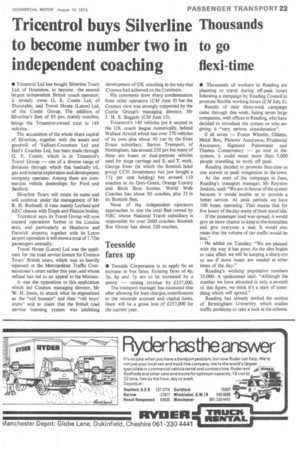Tricentrol buys Silverline Thousands to become number two in to go independent coaching flexi-time
Page 25

If you've noticed an error in this article please click here to report it so we can fix it.
• Tricentrol Ltd has bought Silverline Tours Ltd, of Hounslow, to become the second largest independent British coach operator; it already owns G. E. Costin Ltd, of Dunstable, and Travel House (Luton) Ltd, of the Costin Group. The addition of Silverline's fleet of 85 psv, mainly coaches, brings the Tricentrol-owned total to 149 vehicles.
The acquisition of the whole share capital of Silverline, together with the assets and goodwill of Valliant-Cronshaw Ltd and Hall's Coaches Ltd, has been made through G. E. Costin, which is in Tricentrol's Travel Group — one of a diverse range of divisions through which this basically oil, gas and mineral exploration and development company operates. Among them are commercial vehicle dealerships for Ford and Bedford.
Silverline Tours will retain its name and will continue under the management of Mr R. H. Bushnell. It runs mainly Leyland and AEC chassis with Duple and Plaxton bodies.
Tricentrol says its Travel Group will now expand operations further in the London area, and particularly at Heathrow anct Gatwick airports; together with its Luton airport operation it will move a total of 1.75m passengers annually.
Travel House (Luton) Ltd was the applicant for the road service licence for Cosmos Tours' British tours, which was so heavily opposed in the Metropolitan Traffic Commissioner's court earlier this year, and whose refusal has led to an appeal to the Minister.
It was the opposition to this application which led Cosmos managing director, Mr_ W. H. Jones, to attack what he stigmatized as the "old busmen" and their "old boys' clubs" and to claim that the British road service licensing system was inhibiting development of UK coaching in the way that Cosmos had achieved on the Continent.
His comments drew sharp condemnation from other operators (CM June 8) but the Cosmos view was strongly supported by the Costin Group's managing director, Mr J. H. S. Baggott (CM June 15).
Tricentrol's 149 vehicles put it second in the UK coach league numerically, behind Wallace Arnold which has over 270 vehicles of its own plus about 40 run by the Evan Evans subsidiary. Barton Transport, of Nottingham, has around 250 psv but many of these are buses or dual-purpose vehicles used for stage carriage and E. and T. work. George Ewer (in which the Scottish hotel group CCH Investments has just bought a 171 per cent holding) has around 110 coaches in its Grey-Green, Orange Luxury and Birch Bros liveries. World Wide Coaches has about 90 coaches, plus 33 in its Scottish fleet.
None of the independent operators approaches in size the total fleet owned by NBC whose National Travel subsidiary is responsible for over 2600 coaches. Scottish Bus Group has about 320 coaches.
Teesside fares up
• Teesside Corporation is to apply for an increase in bus fares. Existing fares of 4p, 5p, 6p and 7p are to be increased by a penny — raising revenue by £337,000.
The transport manager has estimated that after allowing for loan charges, contributions to the renewals account and capital items, there will be a gross loss of £257,000 for the current year. • Thousands of workers in Reading are planning to travel during off-peak hours following a campaign by Reading Council to promote flexible working hours (CM July 6).
Results of their three-week campaign came through this week, listing seven large companies, with offices in Reading, who have decided to introduce the system or who are giving it "very serious consideration".
If all seven — Foster Wheeler, Gillette, Metal Box, Phoenix Assurance, Prudential Assurance, Sigmund Pulsometer and Thames Conservancy — go over to the system, it could mean more than 5,000 people travelling to work off peak.
Reading decided to promote ilexi-time as one answer to peak congestion in the town.
At the start of the campaign in June, Reading's transport manager, Mr Royston Jenkins, said: "We are in favour of the system because it would enable us to provide a better service. At peak periods we have 100 buses operating. That means that for five hours of the day many of them stand idle.
If the passenger load was spread, it would give us more chance to keep to the timetables and give everyone a seat. It would also mean that the volume of car traffic would be less."
He added on Tuesday: "We are pleased with the way it has gone. As the idea begins to take effect we will be keeping a sharp eye to see if more buses are needed at other times of the day."
Reading's working population numbers 35,000. A spokesman said: "Although the number we have attracted is only a seventh of this figure, we think it's a start of something which will spread."
Reading has already invited the section of Birmingham University which studies traffic problems to take a look at the scheme.




























































































